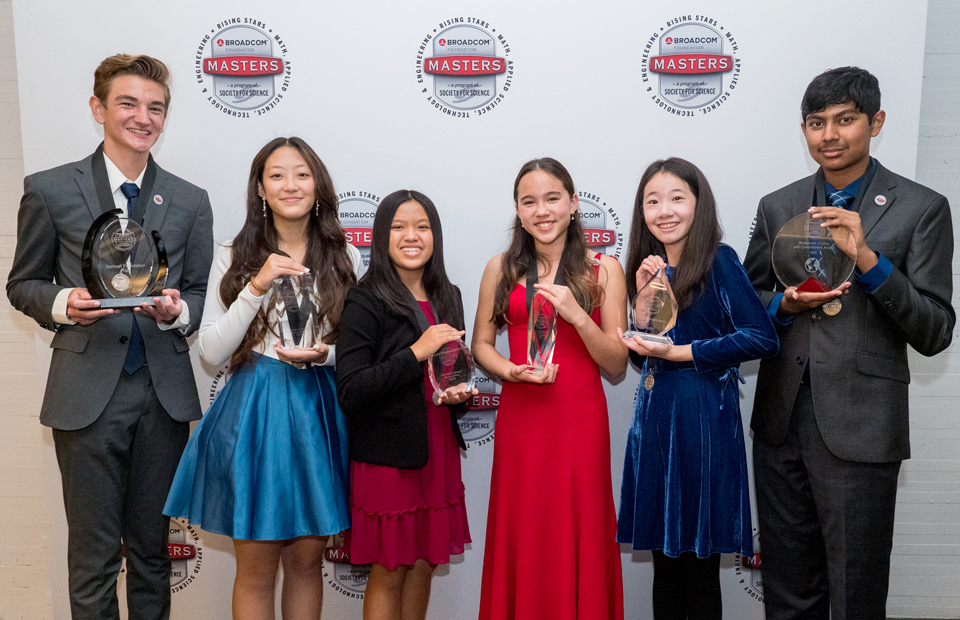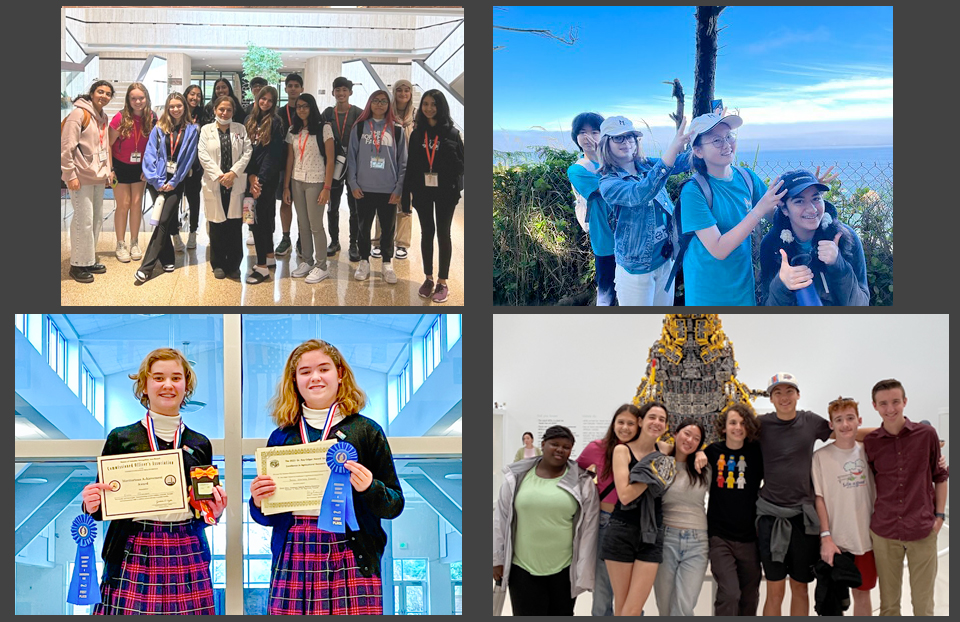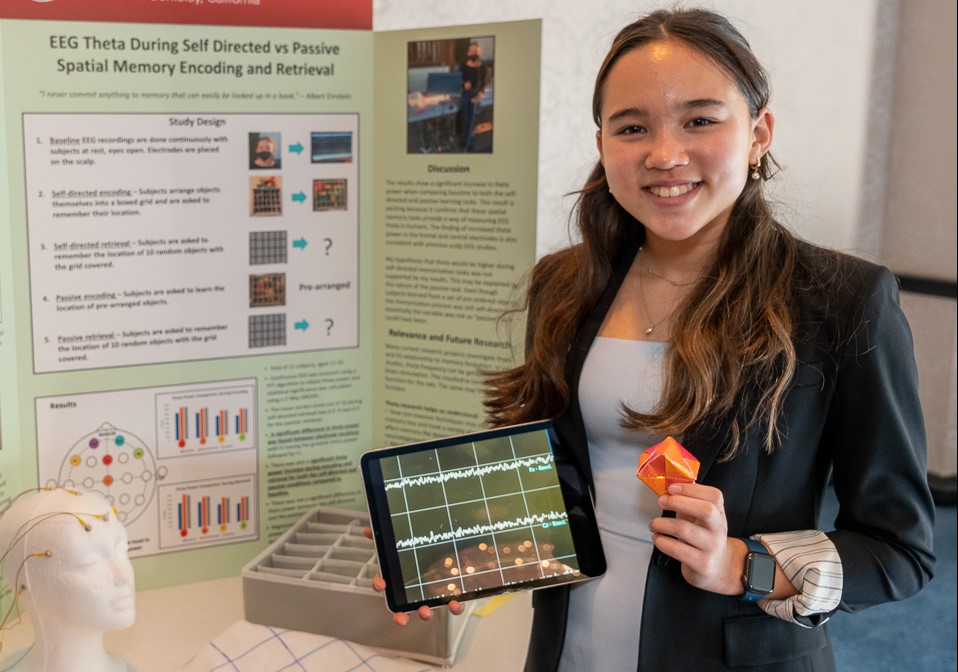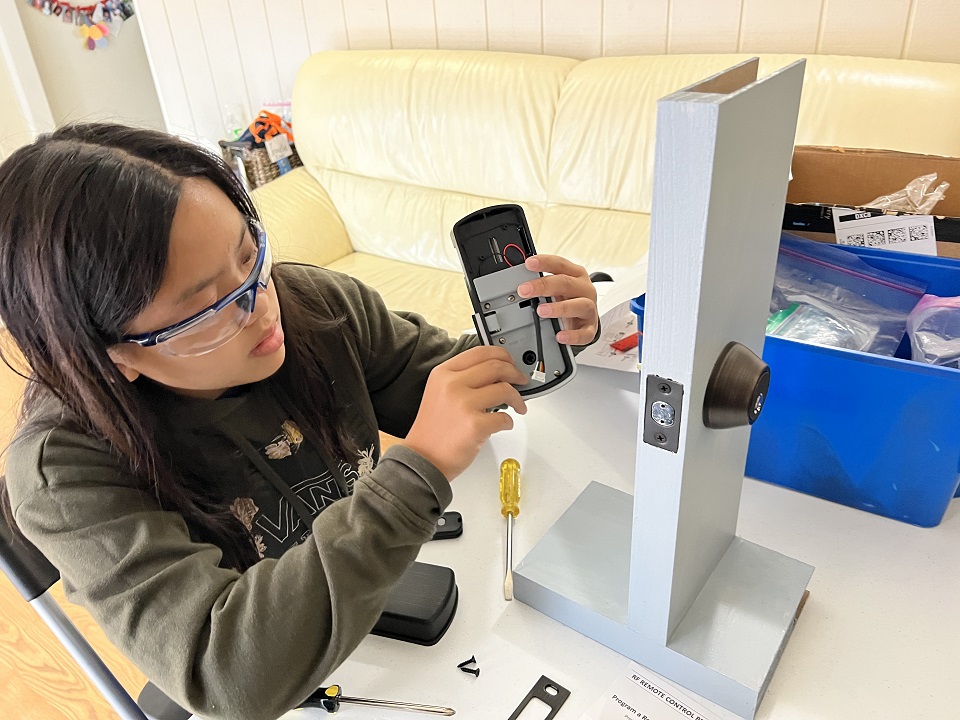14-year-old develops robotic hand to help with disaster recovery; wins $25,000 top award at the Broadcom MASTERS

Broadcom MASTERS awards $100,000 in prizes, inspiring and rewarding the Nation’s next generation of scientists, engineers, and innovators.
WASHINGTON, D.C. – Broadcom Foundation and Society for Science today announced that Thomas Aldous, 14, from Pittsburgh, Penn., won the coveted $25,000 Samueli Foundation Prize, the top award in the Broadcom MASTERS®, the nation’s premier science and engineering competition for middle school students. Thomas impressed the judges with his leadership style, collaborative spirit, and innovative research project. He designed and developed a robotic hand that can be used in situations that might be too dangerous for humans, like a natural disaster.
Thomas’s remote-controlled robotic hand connects fingers on a glove to threads that link to spools with electronic devices. A control board uses data from the devices to prepare and send instructions to the hand, which then mimics the glove-wearer’s movements. Through his design process, Thomas sought to ensure that the controls for his robotic hand would be simple and intuitive.
The other top winners took on issues ranging from honeybee colony collapse to understanding human memory.
The Broadcom MASTERS (Math, Applied Science, Technology and Engineering for Rising Stars), a program of Society for Science, awards middle school students for their STEM passions to inspire them to continue their pursuit of science and engineering. Thirty finalists, including Thomas, took home more than $100,000 in awards.
The competition took place in Washington, D.C., back in person for the first time since the 2019 competition. Each of the 30 finalists participated in team challenges in addition to being judged on their science research projects. The challenges leveraged project-based learning and tested their mastery of 21st Century skills of critical thinking, communication, creativity and collaboration in each of the STEM areas. During the team challenges, the finalists designed a quantum board game, studied blue crabs to build a robotic arm using hydraulics and developed devices that could detect early-stage Parkinson’s tremors.
This year marks the culmination of Broadcom Foundation’s proud 12-year sponsorship of the Society’s middle school STEM competition as Thermo Fisher Scientific becomes the new title sponsor of the Thermo Fisher Scientific Junior Innovators Challenge. Broadcom Foundation will continue partnering with the Society through the Broadcom Coding with Commitment Award, which will be given to a Thermo Fisher Scientific Junior Innovators Challenge finalist who combines STEM learning with coding to solve a community problem that aligns with the 17 Sustainable Development Goals of the United Nations.
“Congratulations to Thomas Aldous on winning the top award in the 2022 Broadcom MASTERS,” said Maya Ajmera, President and CEO of Society for Science and Publisher of Science News. “Thomas’s robotic hand has the exciting potential to help search and rescue workers. Like so many other of our amazing finalists, Thomas looked around him and identified a problem in our world that he sought to solve through STEM.”
“These finalists hold a special place in our hearts as our last Broadcom MASTERS class,” said Paula Golden, President of Broadcom Foundation. “Broadcom Foundation is excited to hand the baton for the middle school competition over to Thermo Fisher Scientific, a company that we know places equally high value on STEM education, and we look forward to being part of their celebration of excellence through the Thermo Fisher Scientific Junior Innovators Challenge.”
Thomas Aldous, 14, Pittsburgh, Penn., won the $25,000 Samueli Foundation Prize, for his project designing a robotic hand as well as his leadership, collaboration and critical thinking skills. The prize is a gift of Dr. Henry Samueli, Chairman of the Board, Broadcom Inc., and Chair of the Broadcom Foundation and his wife, Dr. Susan Samueli, President of the Samueli Foundation.
Rory Hu, 12, San Jose, Calif., won the $10,000 DoD STEM Talent Award for demonstrating excellence in science, technology, engineering or math, along with the leadership and technical skills necessary to excel in the 21st Century STEM workforce and build a better community for tomorrow. Rory’s research on honeybees suggests that feeding bees tea polyphenols and caffeine could boost their ability to learn and remember. She also showed that the chemicals might repair some of the harm done by pesticides, which could help dwindling honeybee populations.
Jeanelle Dao, 13, San Jose, Calif., won the $10,000 Lemelson Award for Invention, awarded by The Lemelson Foundation to a young inventor who creates a promising solution to a real-world problem. Jeanelle invented a foot-controlled welcome mat that wirelessly unlocks a door when the user enters the correct code. The device could help people with arthritis and other hand problems become more self-sufficient.
Elizabeth Shen, 14, Cary, N.C., won the $10,000 Marconi/Samueli Award for Innovation, an honor made possible by Samueli’s generous donation of his 2012 Marconi Society Prize Award. The finalist demonstrates both vision and promise as an innovator, in the spirit of radio inventor Guglielmo Marconi. Elizabeth drew inspiration from the way many flower petals grow and the golden ratio to design a system for better managing the wear on a computer’s memory. Over time, many heavily used cells within computers become damaged, and the memory must be replaced. Elizabeth’s system reduces the average number of times cells were accessed, compared to other options.
Mina Fedor, 14, Berkeley, Calif., won the $10,000 Robert Wood Johnson Foundation Award for Health Advancement, which recognizes the student whose work and performance shows the most promise in health-related fields and demonstrates an understanding of the many social factors that affect the health of communities. Mina used electroencephalography, or EEG, to measure a certain type of brain activity as people did active and passive learning tasks. Mina’s research, which found that the brain doesn’t substantially differentiate between the two different kinds of learning, could impact the way educators teach.
The Broadcom MASTERS winners were chosen from the 30 finalists selected from 1,807 applicants from 47 states and three U.S. territories (Guam, Puerto Rico and the U.S. Virgin Islands). Winners were selected by a panel of distinguished scientists, engineers and educators. Each finalist’s school will receive $1,000 from the Broadcom MASTERS program to benefit their STEM initiatives.
In addition to the top prizes, the Broadcom Foundation and the Society also announced the winner of the $5,000 Broadcom Coding with Commitment Award, first and second place winners in each of the STEM categories of Science, Technology, Engineering and Math. The organizations also named the two Rising Stars who will be official student observers to Regeneron International Science and Engineering Fair (ISEF) and the winners of the Team Award, sponsored by TIES.
Winners Include:
Samueli Foundation Prize: $25,000
Thomas Aldous, 14, Pittsburgh, Penn., Remote Rescue Robot: Robotic Hand Controlled by Human Motion
DoD STEM Talent Award: $10,000
Rory Hu, 12, San Jose, Calif., The Effects of Pesticides, Caffeine and Tea Polyphenols on the Visual and Olfactory Learning and Memory of the Honey Bee
Lemelson Award for Invention: $10,000
Jeanelle Dao, 13, San Jose, Calif., Controlling Doors Using Interface Technology with Steps for People with Hand Disabilities (CONDUITS)
Marconi/Samueli Award for Innovation: $10,000
Elizabeth Shen, 14, Cary, N.C., Flower Petal-Inspired Computer Memory Leveling via the Golden Ratio
Robert Wood Johnson Foundation Award for Health Advancement: $10,000
Mina Fedor, 14, Berkeley, Calif., EEG Theta During Self-Directed Versus Passive Spatial Memory Encoding and Retrieval
Broadcom Coding with Commitment Award: $5,000
Ankit Biswas, 14, Charlotte, N.C., A Novel LP-Based Approach to Mitigating Launch Vehicle CO2 Emissions
STEM Award Winners:
First and second place winners of STEM Awards demonstrated acumen and promise in science, technology, engineering and math. First place winners were awarded $3,500 and second place winners received $2,500 to be used toward a STEM summer camp experience, with top awards in math sponsored by Robert John Floe, President Floe Financial Partners.
Science Award:
- First place: Victoria Harding Bradley, 14, Menlo Park, Calif., Green Ears: A Study of Ultrasonic Acoustic Emissions in Response to Environmental Stressors in Plants
- Second place: Kasey Moore, 13, Delray Beach, Fla., The Effect of Uncaria tomentosa (Cat’s Claw) in Learning and Memory in Lymnaea stagnalis (The Great Pond Snail)
Technology Award:
- First place: Skye Holyn Knox, 14, Bend, Ore., Laboratory Testing of Chemical Cloud Seeding
- Second place: Moitri Santra, 13, Oviedo, Fla., Innovative Engineering Tools for Controlling Harmful Algal Bloom (HAB): Year 3
Engineering Award:
- First place: Alexander Montgomery, 14, Titusville, Fla., The Impact of Different Environmental Conditions on Galvanic Corrosion at Launchpad Structures
- Second place: Emma Abigail Simmons, 13, Emmitsburg, Md., Portable Bronchodilator Delivery System for Equine Inflammatory Respiratory Diseases
Mathematics Award:
- First place: Sritej Sai Padmanabhan, 14, Wexford, Penn., Can Video Analysis of Hand Tremors Aid in Telehealth?
- Second place: Mahi Kohli, Olathe, Kan., Identifying Potential Alzheimer’s Biomarkers in Cerebrospinal Fluid
Rising Star Awards:
In recognition of their promise as two of the youngest competitors, two Rising Stars win the opportunity to attend the Regeneron ISEF, the world’s largest international high school science fair competition, as student observers.
- Tate Baum, 12, Provo, UT, Throwing a Curve Like Kershaw
- Sarah Charlotte Simmons, 13, Emmitsburg, Md., Portable Bronchodilator Delivery System for Equine Inflammatory Respiratory Diseases
Team Award, sponsored by TIES: Each member of the team that best demonstrates their ability to work together and solve problems through shared decision making, communication and scientific and engineering collaboration will receive a gift card to a science supply company to support their interests in STEM. The team award is sponsored by TIES, Teaching Institute for Excellence in STEM.
Blue Team – Thomas Aldous, Shaunak Dalal, Skye Holyn Knox, Moitri Santra, Ethan Yan
Broadcom Leadership Award:
The Broadcom Leadership Award is bestowed upon the Broadcom MASTERS finalist elected by their peers to speak on behalf of their class at the Awards Ceremony. The Class Speaker demonstrates the collegiality and spirited leadership that has earned the collective esteem of the class throughout the Broadcom MASTERS competition and united them around common goals.
- Luka Anthony Nguyen, 13, Henderson, Nev., Which Mangroves (Mature Plants vs. Immature Propagules) Thrive Better and Are Best Suited for Aerial Reforestation?
Resources:
For more information on the Broadcom MASTERS, visit the Broadcom Foundation and Society websites. To keep up with the Broadcom MASTERS, use the hashtag #brcmMASTERS or follow Broadcom Foundation and the Society on Twitter or the Society on Instagram. To stay connected, visit the Broadcom MASTERS and Society Facebook pages.
Media Kit: https://www.societyforscience.org/broadcom-2022-media-kit/


